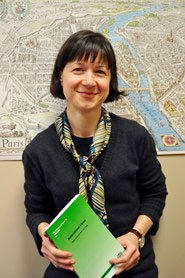UNC, NC State to use data to tackle rare diseases
CHAPEL HILL, NC – The National Science Foundation (NSF) recently awarded $11 million to big data projects and planning activities associated with its Big Data Hubs initiative, including an effort at North Carolina State University (NC State) and the University of North Carolina at Chapel Hill (UNC), to explore the feasibility of building a large data system – the Rare Disease Observatory (RDO) – that will integrate data sets on rare diseases that are currently separate. The project leaders will also investigate how to make these data sets available to a broader set of the rare disease community.
The funding will be awarded through the “Big Data Spokes” program of the NSF’s Big Data Regional Innovation Hubs initiative, which includes data hubs throughout the United States. The RDO award will come through the South Big Data Hub, which is jointly led by RENCI at UNC-Chapel Hill and the Georgia Institute of Technology.
If successful, the Rare Disease Observatory will provide valuable data for large-data analytics and biomedical analysis. The research and clinical progress on rare diseases is expected to lead to improvements in the condition and quality of life of patients and their families.
This research is also expected to provide data that could significantly change health care policies and practices across the nation, while drastically improving the lives of the millions of Americans affected by rare disease. The data will also benefit researchers, clinicians, health care systems, industries and agencies, which could coordinate their activities to address these data challenges.

This project is led by Rada Chirkova, PhD, associate professor of computer science at NC State, and Bruce Cairns, MD, the John Stackhouse Distinguished Professor of Surgery at the UNC School of Medicine, Director of the North Carolina Jaycee Burn Center, and chair of the NC Rare Disease Advisory Council.

“The broadest impact of this project would be to demonstrate that this model of coordination and integration is possible and useful in addressing the large health care problems that affect tens of millions of Americans with rare diseases and their families,” Cairns said.
NC State provides the data-management, data-integration and software-architecture perspective, while the UNC School of Medicine provides the research and clinical expertise, organizational support and connections for rare-disease data repositories.
The UNC School of Medicine has strong programs focused on rare diseases, including one rare disease research initiative currently in clinic.
Due to the rapid expansion in understanding human genetics and related medical syndromes over the past 15 years, more than 7,000 rare diseases have now been identified. In the United States, a condition is considered rare if it affects fewer than 200,000 persons combined in a particular rare-disease group. It is estimated that one in ten Americans -- more than 30 million people -- are living with rare diseases.
According to GlobalGenes, approximately 50 percent of the people affected by rare diseases are children; further, 80 percent of rare diseases are genetic in origin, and thus are present throughout a person’s life. These cases are associated with increasing medical and economic consequences, because many signs and symptoms may not be present at birth and during infancy.
Potential changes to current health care policies could lead to a better quality of life for those affected with rare disease and for their families. The economic impact is also critical for the families, as well as the states, both in regards to Medicaid and the significance of job loss for those parents or relatives who are not able to work due to caring for a person with rare disease.
Determining rare disease may present a significant challenge. Delayed diagnosis and misdiagnosis, fragmented care, and limited access to experts could all add major cost inefficiency. These obstacles can also create needless and additional emotional distress and burden on patients, their families, and caretakers.
The State of North Carolina is becoming a leader in rare diseases, specifically thanks to NC House Bill 823, An Act Establishing the Advisory Council on Rare Diseases that is housed in the UNC School of Medicine at the University of North Carolina at Chapel Hill, which was ratified by the North Carolina General Assembly on July 29, 2015, and signed by the NC Governor on August 5, 2015. The legislation received bipartisan support and passed unanimously through the NC House and Senate.
The goal of the Advisory Council on Rare Diseases is to advise the Governor, the Secretary, and the General Assembly on the research, diagnosis, treatment, and education relating to rare diseases.
Please see https://www.fastlane.nsf.gov/a6/A6RC_8-28-2016.html for some of the recently granted BD Spokes proposals.
Media contact: Tara Britt, 919.417.6130, This email address is being protected from spambots. You need JavaScript enabled to view it.